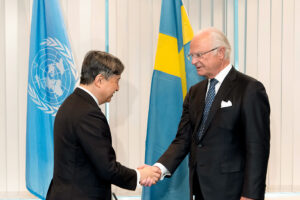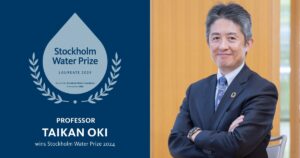Stephen McCaffrey, trailblazer in international water law, wins 2017 Stockholm Water Prize
Stephen McCaffrey, trailblazer in international water law, wins 2017 Stockholm Water Prize.
Stephen McCaffrey, Distinguished Professor of Law at the University of the Pacific, McGeorge School of Law, in Sacramento, California, is the single most respected authority on International Water Law. His work continues to influence scholars, legal practitioners and policy-makers and contribute to the sustainable and peaceful management of shared waters.
On receiving news of the prize, Professor McCaffrey says: “Learning about the Stockholm Water Prize literally took my breath away. I am deeply honoured and humbled to have been selected for this prestigious award. But one also stands on the shoulders of others, and I am most grateful to those who have paved the way for me.”
In its citation, the Stockholm Water Prize Nominating Committee recognizes Professor McCaffrey’s “path-breaking leadership and legal scholarship in international water law. He has made a unique contribution in three specific areas: his seminal work on Treaty negotiation; his major scholarly works, including his book The Law of International Watercourses and; his leadership providing expert legal advice, wise counsel, training and facilitation of complex negotiations with a wide range of stakeholders.”
Professor McCaffrey has been acting as legal counsel to states in several negotiations concerning international watercourses. He has served as counsel in many inter-State disputes over shared water resources, for example between Argentina and Uruguay, Pakistan and India, and Slovakia and Hungary, which have been heard by international courts and tribunals.
I am happy to have taken the first tentative steps toward the development of the human right to water. One of the international community’s most critical challenges during the 21st century will be implementing this right, both in developing and developed countries.–Prof. Stephen McCaffrey
He has guided, often multi-year negotiation processes among riparian countries with respect to transboundary water law, for example, on the Nile, Mekong, and Ganges, some with numerous countries involved. Although he has experienced first-hand the potential conflict over freshwater resources, he remains an optimist, pointing to studies that have shown that shared fresh water is generally a catalyst for cooperation rather than conflict.
“McCaffrey’s effective diplomacy during the years he served as UN Special Rapporteur for the International Law Commission resulted in the 1997 adoption of the draft articles of the UN Convention on the Law of Non-navigational Use of International Watercourses, which embody principles that are the basis for adjudicating international water disputes today and planning for long-term management for countries that share international waters” says the Stockholm Water Prize Nominating Committee.
“I believe nobody who studies, researches or practises in the field of transboundary water management, water law or diplomacy could be unaware of Professor McCaffrey’s contribution to the conceptual and practical elaboration of the many legal concepts and principles that we now take for granted,” says SIWI’s Executive Director Torgny Holmgren.
In earlier writings, Professor McCaffrey articulated the human right to water which was later recognized by the UN General Assembly as a right in 2010. Additionally, he has provided critical insights, linking water law to policy, conflict resolution, benefit sharing, and environmental protection over the years.
“I am happy to have taken the first tentative steps toward the development of the human right to water. One of the international community’s most critical challenges during the 21st century will be implementing this right, both in developing and developed countries,” says Professor McCaffrey.
Water flows where it will and has no regard for national or regionally drawn boundaries. Beneficial hydrological, social, and economic linkages can be fostered among countries which share transboundary waters, with their equitable use promoting peace and development.
I believe nobody who studies, researches or practises in the field of transboundary water management, water law or diplomacy could be unaware of Professor McCaffrey’s contribution to the conceptual and practical elaboration of the many legal concepts and principles that we now take for granted.–SIWI’s Executive Director Torgny Holmgren
Nearly 40 per cent of the world’s population lives in countries that share river basins. Increasing stress on water resources globally will require the reasonable and equitable use of transboundary waters. Improved management of transboundary waters reduces the potential for conflict, fosters socio-economic development, promotes shared benefits, and supports healthy ecosystems and services.
H.M. King Carl XVI Gustaf of Sweden, Patron of Stockholm Water Prize, will present the prize to Stephen McCaffrey at a Royal Award Ceremony on 30 August, during the 2017 World Water Week in Stockholm.
An interview with 2017 Stockholm Water Prize laureate on Youtube








